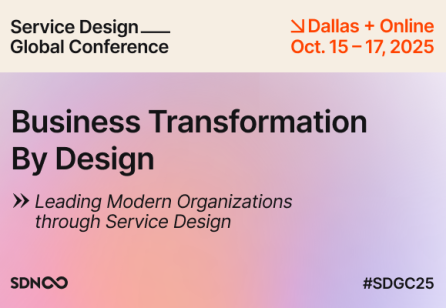Prior to each Volume of Touchpoint, I always engage past Guest Editors and authors, and some of the wider service design community in general, to help determine which topics deserve our focus for the coming three issues. This effort at crowdsourcing the issue themes I hope ensures what gets published in our pages is as relevant as possible.
After soliciting candidate themes for our fifteenth year of publication, there was a runaway winner: AI. It should come as no surprise. In late 2022 we had already identified this topic, and in February 2023 we published Vol. 13 No. 3, on ‘Smart Service Design’, where AI came up in several articles. Since then, AI has seemingly not left the headlines.
We would now like to invite proposals to contribute to an issue devoted to AI and service design, to be published later this year.
As across society more broadly, AI is only just starting to impact our practice in tangible and non-niche ways. Just as tools such as Relume are fundamentally challenging what it means to be a UX’er, soon our methods and tools will be supported - and in some cases, replaced - by AI-driven applications. Whether or not we are involved, tomorrow’s services will more and more have AI behind the scenes.
We are interested in proposals for articles that address some of the following questions, amongst other:
- How do we best prepare ourselves for the advent and widespread roll-out of AI-driven service experiences? What is a minimum level of domain knowledge we need, and what does a service designer specialized in AI look like?
- Do we need to somehow educate and prepare those that commission our services, such as clients and stakeholders, about how to best deploy AI for the services they deliver? If so, what is our advice?
- What aspects of the work we do will be done better with the help of AI, and how can we expedite that support? Conversely, what parts of our practice do we feel must always done by a human, and how is that preserved?
- Following on from the previous questions, what broader ethics questions arise with AI-supported and AI-delivered services, and what is our role in ensuring that users and customers aren’t disenfranchised, discriminated against or even abused? Who else outside our field is staking out positions on the responsible deployment of AI, and what can we learn from them?
- How do we ensure that the data that many of us have collected about our current service users is responsibly used to feed AI datasets, and not abused or misconstrued?
- What applications of generative AI stand to support services designers in their work?
- Are the service designers of tomorrow - coming through schools and universities, or cross-skilling from adjacent professions - being educated to become comfortable designing with and for AI? If so, what does that education look like?
- How do we design services, and especially ones that traverse borders, while adhering to guidelines imposed by industry bodies and governments and regulators? What guidelines which affect our work do we need to be aware of, and do we have a place at the table in developing those guidelines?
We welcome contributions from throughout the service design community, as well as those with knowledge and experience in this theme, to contribute to this issue. By doing so, you will be helping service designers make the next step towards an even more mature practice of our discipline.
Regular sections
Besides handing in articles related to this issue’s feature, you are also invited to hand in content for the other regular sections of Touchpoint, which are not related to the theme of the issue:
- Cross-Discipline: Highlighting the connection between service design and other disciplines
- Tools and Methods: Introduction and evaluation of techniques and activities for service design projects
- Education and Research: Insights from academia and research.
Abstract submission:
Read more and submit your abstracts via the online form until 24 February 2024 (23:59 CET).
We are looking forward to many inspiring contributions!







Share your thoughts
0 RepliesPlease login to comment